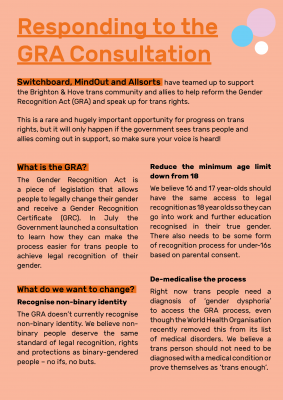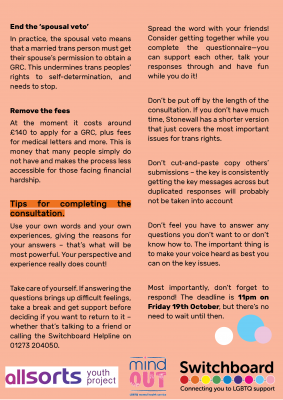Switchboard, MindOut and Allsorts have teamed up to support the Brighton & Hove trans community and allies to help reform the Gender Recognition Act (GRA) and speak up for trans rights. Together we’ve made this quick and easy guide to help make it as simple as possible to make your voices heard on the most important issues.
This is a rare and hugely important opportunity for progress on trans rights – but it will only happen if the government sees trans people and allies coming out in support, so make sure your voice is heard!
What is the GRA?
The Gender Recognition Act is a piece of legislation that allows people to legally change their gender and receive a Gender Recognition Certificate (GRC). In July the Government launched a consultation to learn how they can make the process easier for trans people to achieve legal recognition of their gender.
The GRA consultation is a questionnaire with 22 questions. It can take around an hour or more to complete in full.
There is also a shorter version, published by Stonewall, which only takes 10 minutes to complete. The deadline is 11pm on Friday 19th October.
What do we want to change?
The GRA is currently an unnecessarily complicated, disempowering and expensive process. We want to see huge changes to this, by emphasising self-determination and improving accessibility and inclusivity.
They key points that we think need to change are:
- Recognise non-binary identity – The GRA doesn’t currently recognise non-binary people. The main argument they give against this is that it will be inconvenient and difficult to change other administrative procedures than rely on binary gender, such as pensions. But this was the same argument given before binary trans people were legally recognised, or ‘same-sex’ marriage was legalised. Non-binary people deserve the same standard of legal recognition, rights and protections as binary-gendered people – no ifs, no buts.
- Reduce the minimum age limit – Currently the process is only open to those aged 18+, yet at 16 you can make hugely important life decisions, like joining the armed forces, beginning full-time work and getting married. 16 and 17 year-olds should have the same access to legal recognition as 18 year olds so they can go into work and further education recognised in their true gender. There also needs to be some form of recognition process for under-16s based on parental consent.
- De-medicalise the process and recognise trans people’s right to self-determination – Right now trans people need a diagnosis of ‘gender dysphoria’ to access the GRA process, even though the World Health Organisation recently removed this from its list of medical disorders. Applicants are also required to provide evidence of living for two years in their so-called ‘acquired gender’. We would like to see a simple administrative process based on self-determination whereby a trans person does not need to be diagnosed with a medical condition or prove themselves as ‘trans enough’. This system is already in place and works well in a number of countries such as Ireland, Malta, Argentina and Norway.
- End the ‘spousal veto’ – In practice, the spousal veto means that a married trans person must get their spouse’s permission to obtain a GRC. This is yet another example of trans people’s right to self-determination being undermined. What’s more, a recent survey found that 44% of married trans people said their spouse had actively tried to prevent them from transitioning.
- Remove the fees – At the moment it costs around £140 to apply for a GRC, plus fees for medical letters and more. This usually comes up to about £300. This is money that many people simply do not have and makes the process less accessible for those facing financial hardship.
Tips for completing the consultation.
Do:
- Use your own words and your own experiences, giving the reasons for your answers – that’s what will be most powerful. Your perspective and experience really does count!
- If you’re an adult, you can also speak from your experience as a younger trans person or child, if this is relevant to you. The consultation is not very accessible for young people and children, so this is a powerful way of advocating for their rights.
- Take care of yourself. If answering the questions brings up difficult feelings, take a break and get support – whether that’s talking to a friend or contacting one of our team.
MindOut 01273 234839 www.mindout.org.ukSwitchboard 01273 204050 www.switchboard.org.uk Allsorts 01273 721211 www.allsortsyouth.org.uk - Spread the word with your friends! Consider getting together while you complete the questionnaire—you can support each other, talk your responses through and have fun while you do it!
Don’t:
- Don’t be put off by the length of the consultation.
- Don’t cut-and-paste copy others’ submissions – the key is consistently getting the key messages across but duplicated responses will probably not be taken into account
- Don’t feel you have to answer any questions you don’t want to or don’t know how to. The important thing is to make your voice heard as best you can on the key issues.
- Most importantly, don’t forget to respond! The deadline is 11pm on Friday 19th October, but there’s no need to wait until then.
Where can I find out more?
These organisations have provided in-depth information about the GRA if you’d like to learn more or get more advice on how to respond.
- Stonewall: https://www.stonewall.org.uk/gender-recognition-act – including a quick 10minute version of the consultation and a question-by-question guide to answering
- LGBT Consortium: https://lgbt.foundation/gra
- Gendered Intelligence: http://genderedintelligence.co.uk/gra
Complete the consultation here.
Download our flyer to responding to the GRA.


